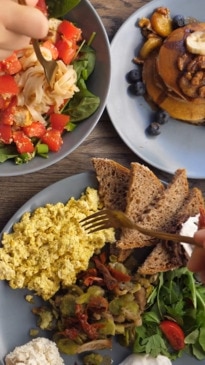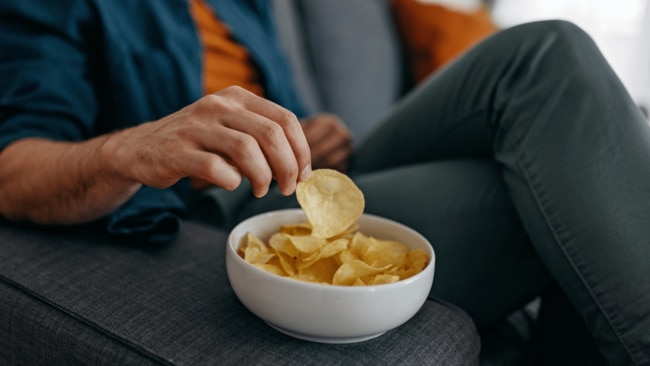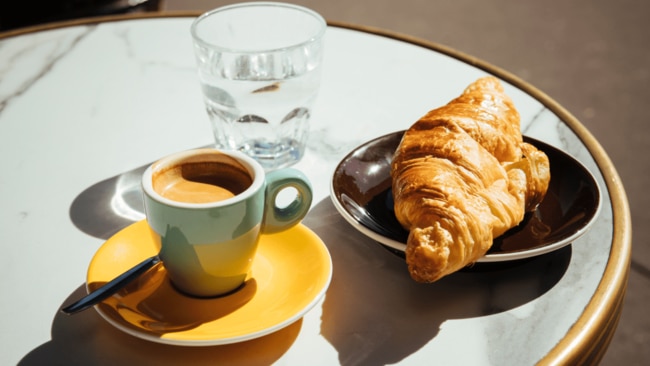Had a big day? You probably shouldn't use food as a reward
It might do more harm than good

Lifestyle
Don't miss out on the headlines from Lifestyle. Followed categories will be added to My News.
With the vast majority of us being rewarded with food during childhood, it's little wonder that we treat ourselves with the likes of chips and chocolate as adults. But is it the best strategy to self-soothe? Dietitian Susie Burrell explains why you might want to think twice.
The cheeky glass of wine that you pour after a challenging workday. The row (or four) of chocolate because you have been good and made it to the gym. Ordering your favourite fast food meal when you have finished a big project.
These are all common scenarios in most of our lives and while it is not uncommon to use food as a reward, it is certainly worth considering if regular food rewards are doing your diet more harm than good.
Why do we seek out food rewards?
It comes as no surprise that when we are looking to feel better after a bad day; a relationship breakup; a fight with a friend or family member or even to relieve ourselves of boredom, we reach for food.

Like what you see? Sign up to our bodyandsoul.com.au newsletter for more stories like this.
Food is cheap, readily available and gives us an instant hit thanks to the alcohol, sugars or fats it contains. Like all things in life, when a treat is enjoyed occasionally there is no cause for concern. On the other hand, when we find ourselves constantly rewarding ourselves, or our kids with food, there are some long-term consequences worth considering.
The more you have, the more you want
You may have noticed that what was once an occasional chocolate biscuit or row of chocolate is now more likely an entire packet of biscuits or a block of chocolate to achieve the same satisfaction.
We need more of an intense food stimulus over time as the brain becomes used to amounts of fat and sugars very quickly, so you need more of the same food to get the same hit. For this reason, when you do reach for a sweet treat or more indulgent food to enjoy, practice savouring small volumes rather than permitting yourself to consume larger quantities over time.

Poor quality food is not a reward for your body
When we discuss treats, we rarely talk about the reality that many foods we consider to be ‘treats’ are generally poor quality, ultra-processed foods such as sweet chocolate bars, ice-cream packed full of chocolate and lollies and refined cakes, biscuits and pastries, that are ultimately causing damage to the body over time.
For this reason, if you do seek out a treat, focus on making it as healthy an option as possible, for example, seeking out good quality dark chocolate rather than a chocolate bar packed full of lollies and biscuits. Or, a single scoop of good quality ice cream rather than large servings of options packed full of lollies and extra sugars.
Thinking of it as a reward will make you want it more
When we identify particular foods as ‘special’, or as a ‘reward’, it escalates the food from a day-to-day option to something that has an emotional pull, so we reach for it based on emotion as opposed to actually feeling like eating it.
Rather than thinking of particular foods such as wine, chips or chocolate as a reward, when you are seeking out food, take time to consider what you are looking for – in many cases, it may not even be the food you have linked to the emotion you are experiencing. Taking time to consider this will help prevent autocue eating that is driven by emotional programming.

Eating when you're not hungry can lead to overeating
When we routinely use food as a reward, and in particular sweet foods that are easily overconsumed such as biscuits, chocolates and cakes, in many cases, we are eating them when we are not hungry.
Regularly eating when we are not hungry not only leaves us vulnerable to overconsumption and weight gain, but it means that we become less and less aware of our natural hunger and fullness signals over time. For this reason, if you are seeking out a food reward, try to at least make sure you are hungry for it before eating.
They are often consumed at the worst time of day
It is safe to say that we are much more likely to reward ourselves with a glass of wine or a sweet treat after dinner, and while this is the time many of us sit down and decompress after a long day, the reality is that it is the worst time to indulge with high calorie, high fat and sugary foods.
Not only does consuming alcohol and concentrated sugars at night impact sleep, but from a calorie intake perspective, a higher calorie intake throughout the second half of the day is conducive to weight gain. For this reason, if a treat at night is your thing, try and keep the options as calorie-controlled as possible.
More Coverage
Originally published as Had a big day? You probably shouldn't use food as a reward





